
Sun, swimming, smoking and seagulls: a day in the life of beach hut Britain
Everyone who meets Bonny Holland says the same thing: she really loves beach huts. “Bonny posts in our Facebook group about four times a day,” says the Hove and Portslade councillor Robert Nemeth, who founded the Hove Beach Hut Association. “I have to approve the posts.”
Inside Holland’s beach hut, the 62-year-old retired headteacher keeps a double-ring stove, a frying pan, a griddle pan, graffiti removal wipes, and, best of all, a loo. “You sit on this,” Holland says merrily, unfolding a portable toilet seat for my benefit, “and go in here.”
In Hove, rows of beach huts line the promenade like multicoloured teeth. Six-foot square, they have no sanitation, electricity or heating. You can’t lie down in them, either, although – if you have Holland’s ingenuity – you can cook a meal, or go for a wee.
All are painted identically, but the doors can be any colour the owner chooses.
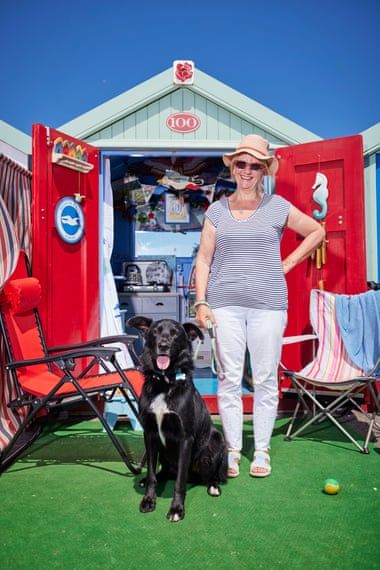 Bonny Holland in Hove.
Bonny Holland in Hove.
These wooden sheds hold their value about as well as a new car driven off a forecourt straight into a motorway pile-up. Blustery winds and sea salt spray batter them and corrode them. In winter, there is black mould, and mice are a common problem. Sometimes, the huts are blown off the promenade by stormy winds. A well-made hut will last a decade before it needs replacing, but requires repainting and resealing every year.
If all of this appeals, and you live in Brighton or Hove, a beach hut can be yours for between £25,000 and £35,000 – plus £416 a year in rent. Since Covid, demand has risen dramatically. “It has been ridiculous this year,” says Heather Hilder-Darling of Callaways, which handles all sales. “Beach huts have been like gold dust.” For the first time ever, buyers have been putting in blind offers. It is a similar story elsewhere: earlier this year, a beach hut in Mudeford Sandbank sold for £320,000. Owners renting out their beach huts on Airbnb have easily doubled, even tripled, their fees. Lengthy waiting lists for huts across the UK are now commonplace.
Holland’s hut is called Rose’s Rest – after her mother. “I’ve wanted a hut since I was eight,” Holland says. “We were walking along the promenade, and my mum said, ‘What do you want for Christmas?’ I said, ‘A beach hut.’” But it took until last June for Holland to fulfil her life’s desire – buying her hut for £25,000. During the pandemic, it has been a safe haven. “Life slows down when you sit inside” she says. “Hours go by, hardly noticed. I might arrive here with lots of things to do and end up doing none of them.”
Holland presses a slice of rocky road on me. We look out at the sea on the first sunny day for weeks. People are paddleboarding in the still, cerulean waters. Hut owners arrive in flip-flops, carrying wine coolers and hampers. Everything is peaceful, until Holland suddenly leaps from her folding chair. “EEEEddiie,” she yowls, waving as if she is marshalling a jumbo jet in to land. Eddie is Holland’s pet seagull. Today, he is not stopping.
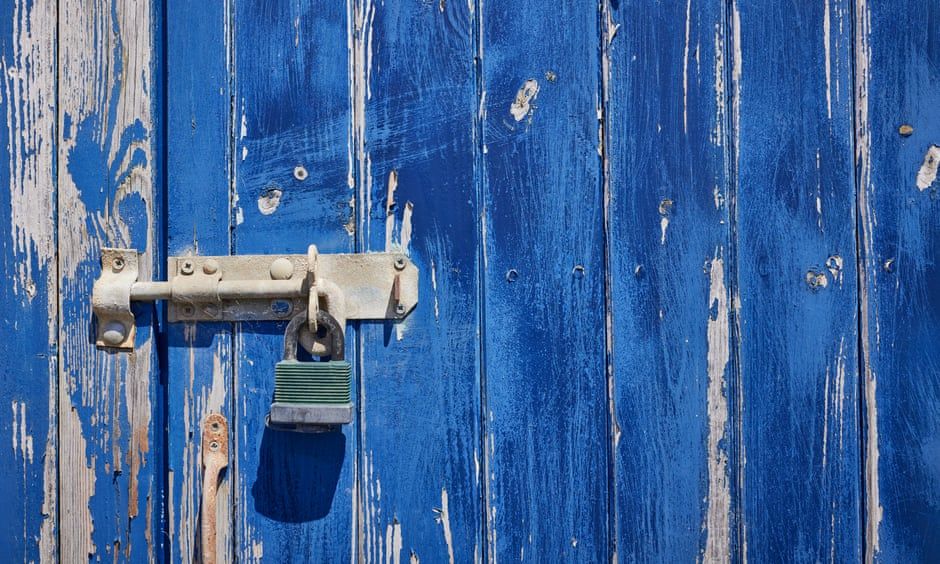
Hut owners, Holland says, debate one thing constantly: locks. They corrode from the sea water and often seize up. “Some people say you must put Vaseline on them,” she says. “Then there is a breakaway splinter group that thinks you should wrap them in tinfoil, to stop the ionisation. Other people use jiffy bags. And some people get a milk bottle, cut a section out, and hook it over the lock.” During lockdown, Holland gave a lecture on beach huts to a local architecture group. She had 20 slides on proper lock maintenance. “They were falling off their chairs in laughter,” she says. “I didn’t intend it to be funny.”
The hut owners are a community. “It’s like a village.” But they also fall into categories. “This is a lifestyle hut,” says Holland. “You write your journal, sunbathe, chill. The next three along; they’re all sports. Guys turn up and pump up their paddleboards. That one is a swimmer’s hut. This amazing lady turns up in the morning, goes for a swim, smokes some Gauloises and goes home. She’s a French academic in her 80s. Very interesting. She talks about Sartre and De Beauvoir. She’s not talking about Love Island. You’re having a proper conversation. There might be a test at the end.”
As if on cue, her neighbour, 60-year-old joiner Gerry Dalton, arrives. They begin comparing huts. “Mine is so much bigger than yours,” Holland crows. “That’s because yours is the wrong size!” he responds. I leave their heated, but good-natured discussion about whether the lettering of Holland’s sign, which is numbered 100, looks like the word “loo”. (It does.)
“Locks,” says Nemeth seriously. “Locks are an issue. You have to spend a lot of money on decent ones or they just rust up. And if you buy high-strength ones they’re hard to cut off.” Nemeth, a Conservative who has represented Wish ward since 2015, is taking me on a tour of Hove’s beach huts.
We are standing at the Brighton end of the beach. This used to be the more desirable, due to its proximity to the Regency architecture of Hove Lawns, and Brighton, but in recent years, huts towards the western end have become popular with families, thanks to the redevelopment of cafes and playgrounds around Hove Lagoon.
In 2018, Nemeth successfully organised the beach-hut owners to overturn a council proposal to impose a 20% tax on any beach-hut sales. I ask Nemeth what was so unfair about this – after all, some of the hut owners bought their huts for a few thousand pounds, and now find them worth tens of thousands.
“There were almost accusations of beach huts being a preserve of the wealthy,” says Nemeth of the confrontation with the council. “It was based on a complete misunderstanding of the reasons people buy beach huts.” He tells me that many owners don’t have gardens, and this is their outside space. Plus, the huts cost a fortune in upkeep, offsetting any increase in value. “You’ll easily spend £10,000 on maintenance in a decade,” he says.
These are all fair points. But, if not the preserve of the wealthy, beach huts, here at least, appear to be the preserve of the affluent. The owners I meet are all lovely – but they’re not exactly people on a low-income. There is one woman who retired in her 40s, and there’s a man who talks about flying light aircraft to the Loire Valley for lunch. There are council-owned beach huts, known as chalets – brick, with electricity and running water – but the waiting list is closed, and those on it have scant chance of reaching the top within their lifetimes.
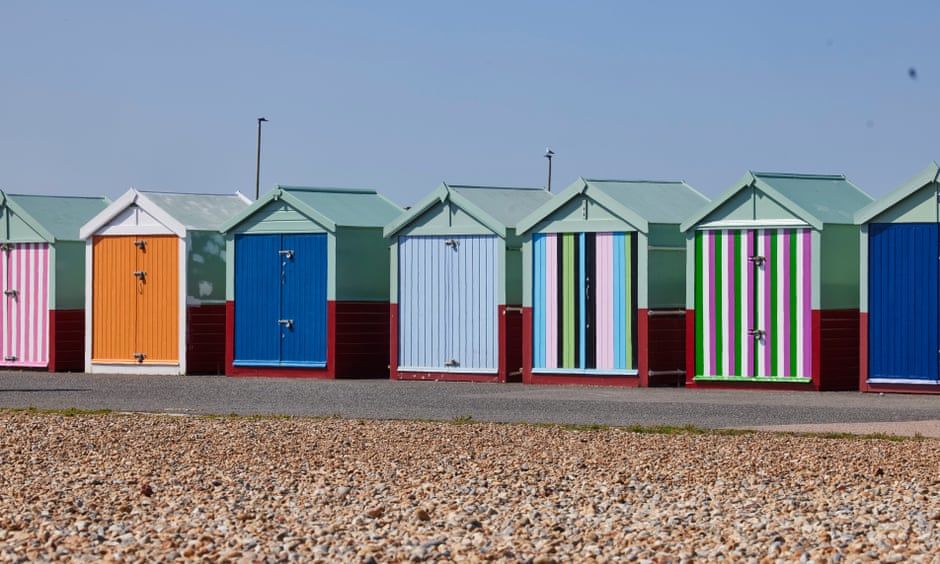 Beach huts at Hove.
Beach huts at Hove.
The council also recently announced that the open-ended leases on the chalets would end, so tenants will no longer have one for life. Nemeth voted in favour of this. “We looked at the issue of how to fix these infinitely long lists,” Nemeth says. Outside one, Nemeth talks to a man who looks as if he is in his 70s, eating a sandwich. “I’m sorry it didn’t go your way,” he tells him. The man waves us away with a sour expression.
Traipsing up and down the promenade with Nemeth, it is clear everyone has an opinion about how the beach huts should be managed. Nemeth is accosted by a couple angry that the public toilets aren’t being properly maintained. As they list their grievances, I slope off to hut 175, which is owned by Peter Revell, a 57-year-old semi-retired solicitor and his partner, Gerard Phillips, 59, a cybersecurity programme manager. Their hut is on the best part of the promenade: there are no walls or railings obstructing the view, with only 10 metres or so of pebble beach between them and the lapping sea. “We love this stretch,” says Revell.
They kindly pour me a glass of wine. Some friends pop by for a drink. “It’s a very sociable thing,” says Phillips. “Three of our neighbours have keys. We like it being used.” Talk turns to the latest threat to the beach huts: a proposed £3.5m Surf Life Saving Centre on the seafront, which would train first aiders and lifeguards. If approved, huts will have to be moved, to make space. The association is against it. “The idea of a Surf Life Centre is not a bad idea,” says Revell. “But it’s the position, the height of it. We’ll have to move beach huts. We don’t like the precedent it will set.”
He turns to me with an apologetic smile. “You could say we’re a bit nimby,” Revell admits.
An hour later, a visibly sunburned Nemeth rejoins me. The irritated couple are friends now, he says. They have invited him round for drinks. He doesn’t mind. Nemeth sees the beach-hut owners as custodians of the seafront. “They’re taking a very high-profile part in looking after Hove’s heritage,” he says. “The beach huts are an iconic part of Hove.”
And there is perhaps no better custodian than 63-year-old homemaker Alexandra Wickett. She is Hove beach’s longest-standing beach-hut owner. Her hut used to belong to her parents, Ken and Jane. By coincidence, we meet on what would have been their wedding anniversary.
“Mum and Dad met on the beach,” says Wickett, who is fashionably dressed in lime green trousers and a matching necklace. “My mum was a little young thing sitting on the wall, and my dad walked past and went, phwoar, and the rest was history.” Jane died three years ago; Ken a year later. Both had dementia in their final years. “Even when mum was not in a good place,” says Wickett, “you’d get her down here and she’d sit in the seat, and somehow those memories would just pop back in, and chill her out.”
Ken was a sea-swimmer. When he returned from the second world war, he came down to swim every day during his lunchbreak. “He was so physically fit,” says Wickett. She was an August baby, and her parents brought her to the beach on the day she was born. “My family was all the other people who had huts on the beach,” she says. Continuing the family tradition, Wickett brought her children down to the beach hut the day after they were born.
“Back then,” says Wickett of the postwar period, “no one really wanted the huts. There were loads that were empty. Now people are desperate for them.” Huts evolved from the bathing machines first used by swimmers in the 1750s. People would change into bathing suits in them, before they were rolled down the beach. After their swim, they’d be rolled back up.
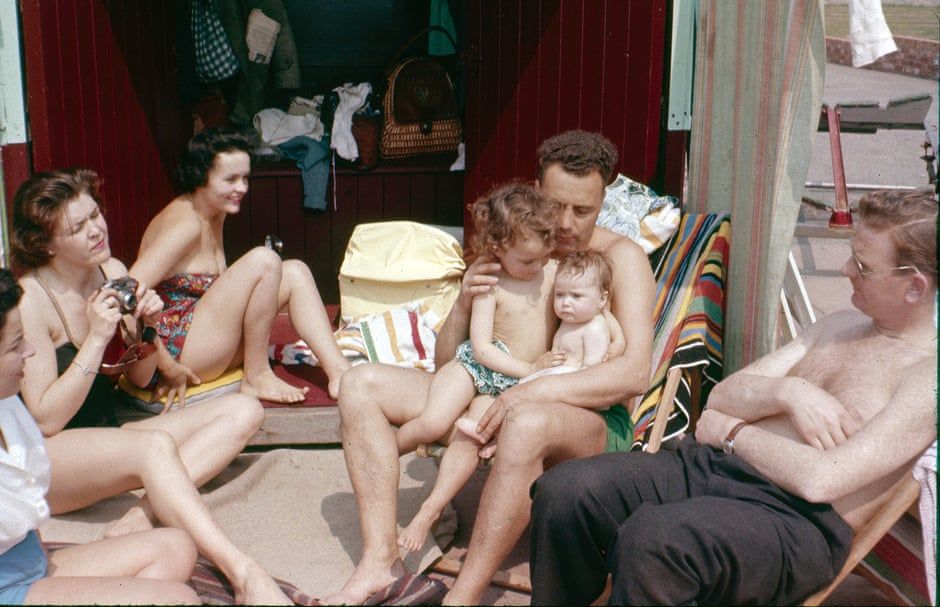 Alex Wickett’s parents at their beach hut in Hove in the 1950s.
Alex Wickett’s parents at their beach hut in Hove in the 1950s.
At that time, swimming was not recreational. “When the rich went to these resorts initially,” says Dr David Jarratt, an expert in the tourism economy at the University of Central Lancashire, “it was seen in a medicinal way.” Elites frequented spa towns such as Scarborough and Bath in the 17th century, to drink the waters, believed to protect people from diseases such as cholera and TB. By the 18th century, focus switched to the health-promoting qualities of the seaside.
Where the rich went, ordinary people followed. The construction of the railways in the 19th century supercharged this process, making it easier for the aspirational middle classes to travel to Blackpool, Morecambe and Skegness. The working classes, meanwhile, visited the coast to escape the smog of rapidly industrialising cities.
But, in the 1960s, as air travel became more accessible, seaside towns lost their glamour. Cheap package holidays to Spain and Greece became popular, leaving the British seaside to fall into terminal decline. “In the 80s, we were all going abroad,” Holland remembers. “We didn’t want to be hanging out by the sea.”
But Covid has forced Britain to look again; to wobble once more down pebbled beaches, wrists sticky with ice-cream, protecting our chips from the marauding gulls. “We haven’t had a holiday and we’re not likely to this year,” says Wickett. “But I don’t need it when I’ve got this. It’s like a refuge.”
Once more, Britons are flocking to seaside towns, to escape diseased air, and enjoy a place that invigorates as much as it relaxes. “In between lockdowns,” says Jarratt, “there’s been a clear movement of people going to rural and coastal settings. It’s about escaping the crowds and breathing fresh air.”
Sundown on Hove beach. The waters are choppier. The seagulls emboldened. People on the promenade hold takeaway pints in plastic cups. A father chastises his son for throwing stones at his face. Outside a rainbow-striped hut towards the Brighton end of the beach, three men sit on an artificial lawn, drinking and laughing. This is Hove Pride Hut.
“It’s become a bit of a feature on the seafront,” says Clive Sanders, 55, a financial controller. He owns it with his partner, 54-year-old brand strategist Neil Cavalier-Smith. They are with their friend Martin. “It’s funny,” says Sanders, “because when Neil decided to buy it, I wasn’t 100% sure. And then it was so much better than I ever imagined.” Cavalier-Smith chips in: “We just love it. It’s weird.”
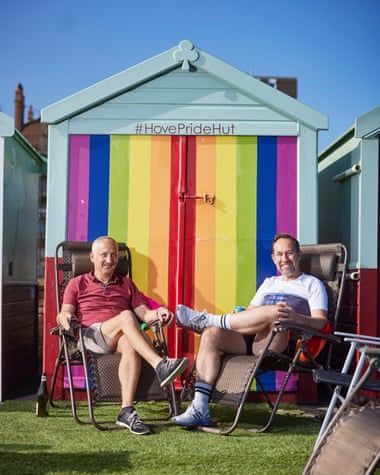 Clive Sanders (left) and Neil Cavalier-Smith outside their #HovePrideHut.
Clive Sanders (left) and Neil Cavalier-Smith outside their #HovePrideHut.
Cavalier-Smith painted it himself. Above the hut is a decal, reading #HovePrideHut. He ducks into the hut, and emerges with the decal he considered instead. “#Big … Gay Beach Hut,” I read as he unfurls it. “I like it.” Cavalier-Smith grins. “I’ve also got some new hinges that swing both ways,” he says.
In summer, it’s a social hub, he says. The worst thing about hut ownership, he laughs, “is the people pissing on the hut. Unquestionably.” (Antisocial behaviour is a particular problem during warm weather, with people sometimes practising parkour along the hut roofs, or breaking in, looking for valuables.) Cavalier-Smith breaks off as a woman approaches him from a neighbouring hut. Inevitably, she wants to talk about locks.
I wind my way down the beach, past parents packing inflatables and overtired children into sedans that smell of baked metal. It is curious, this ardent devotion to these expensive, mildewing, salt-scraped sheds. “This is our little patch here,” Sanders said earlier, fumbling to explain.
But I understand. There is something deep in the British psyche that makes us want to stake a claim to a little piece of the coastline that is ours alone. To have a place to sit, to laugh, to socialise, to think, in front of an endlessly advancing and receding sea, while, above, the seagulls squawk and swoop, and life’s problems seem but a distant flag, waving on the horizon.










